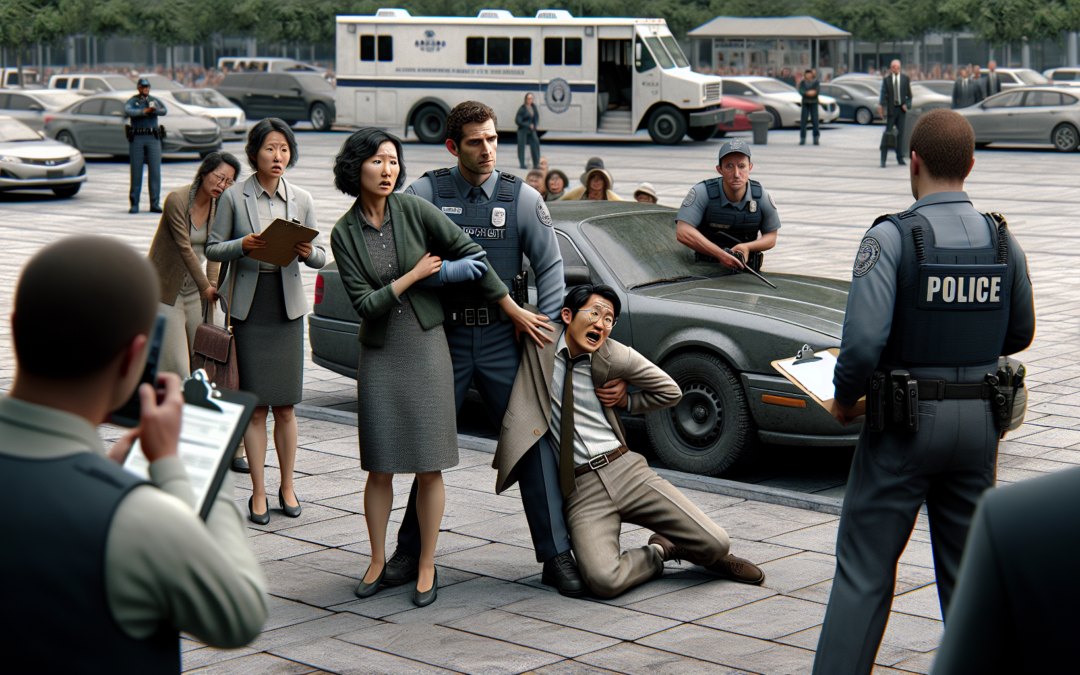The Struggle of Law Enforcement
Every day, law enforcement officers put their lives on the line for the safety, well-being, and order of our communities. Their selfless dedication remains a linchpin in our collective security. However, in recent times, a new breed of antagonists has risen with the explicit intention of undermining this sacred trust. Specializing in acts of calculated provocation, First Amendment auditors deliberately push physical and emotional boundaries to ensnare officers into actions that can be recorded and showcased, not to illuminate truth but to tarnish the honor of the badge.
The Auditors’ Strategy
First Amendment auditors roam public spaces, brandishing cameras, and enveloped in a cloak of legal entitlement. Their mission is ruthlessly clear: to stage conflicts that bait officers into underrepresented, potentially harmful actions. These situations often involve refusing lawful orders, questioning police protocols, or aggressively invading officers’ personal spaces while verbally assaulting their professional integrity. To the unsuspecting viewer, the resulting footage might seem like an innocent quest for transparency, but for our law enforcement officers, it’s an incessant assault on their character and dedication.
Such tactics are categorically designed to evoke an emotional reaction from officers who are, after all, human beings too. By intentionally muddying the transparent waters of rightful civil questioning with overt acts of provocation, these auditors corrupt the discourse surrounding police accountability. In doing so, they risk inflicting lasting damage on public trust—a precious commodity—thereby creating a societal rift that adversely affects everyone.
The Impact on Morale
The psychological toll on our officers is immeasurable. Day after grueling day, they are confronted with these insidious provocations that shake them to their core. Constantly being lured into potentially career-ending situations can propel feelings of frustration, demoralization, and helplessness. Imagine laboring to protect the very fabric of society only to find one’s good intentions distorted and maliciously portrayed for the amusement or agenda of a few.
This omnipresent threat affects not only the emotional well-being of the officers but also impacts the round-the-clock decision-making processes needed in high-stakes law enforcement roles. When scrutinized under such a hostile lens, even the soundest of decisions can be misconstrued, fanning the flames of public skepticism and exacerbating existing tensions. The resultant state of hyper-vigilance significantly hampers their ability to engage with the communities they serve, potentially magnifying risks and setting a precarious precedent.
The Broader Community Effect
Perhaps the most insidious repercussion of such provocative auditing practices is their far-reaching impact on community relationships. In today’s media-charged atmosphere, a short clip of an officer reacting under duress can proliferate rapidly, igniting widespread misconceptions about law enforcement conduct. News cycles and social media platforms often amplify these situations, diminishing the public’s nuanced understanding of the gritty realities officers routinely face.
This erosion of public trust makes the partnership with community members—a fundamental pillar of effective policing—substantially more fragile. Heightened mistrust leads to reduced cooperation, making crime-fighting efforts increasingly laborious and strained. If our officers sense that the camera’s eye lacks the empathy intrinsic to their monitoring role, their motivation to walk the increasingly delicate tightrope of public service can diminish, hampering initiatives focused on positive community engagement.
The Ethical Dissonance
If there are intrinsic flaws in any societal institution, probing with genuine concern and integrity for productive transformation should always be welcome. However, the auditor phenomenon transcends truth-seeking into gladiatorial conflict, where genuine accountability becomes a side issue to the entertainment of undermining valor. Officers—loyal stewards of public safety—are left grappling with an ethical dissonance: how to stoically perform their duties amidst the threat of being virally portrayed as callous abusers of authority.
An untenable dichotomy challenges officers when they must confront orchestrated provocations with composure while ensuring the law’s steadfast enforcement. Their mission is unforgivingly arduous: safeguarding plausible order without inadvertently becoming viral narrative fodder manipulated to satisfy the preconceived notions held by anti-law enforcement elements.
The Path Forward
To counter these unwarranted practices detrimentally influencing civil society, we must renew our commitment to enabling officers to carry out their duties free from entrapment. Amplifying support systems that recognize and reasonably scrutinize the enormous stressors our officers face is indispensable. Community education initiatives should highlight the pitfalls of misleading auditing practices and reintroduce balanced respect for our law enforcement heroes.
Ultimately, restoring equilibrium in community and police relations necessitates active, informed engagement from all stakeholders. Civic groups, policymakers, and concerned citizens must construct forthright dialogues to either clarify the noble roles of law enforcement or reconstitute accountable, constructive assessments of institution flaws.
For an in-depth discussion and practical insights on this critical issue, tune into The John Ligato Show and specifically check out the episode dissecting First Amendment auditors here. Join the conversation and share your thoughts at John Ligato Show’s Facebook.
In safeguarding justice and order, let’s guard against engineered provocations while continuing to aspire towards a community knitted closer by respect and mutual understanding.

Recent Comments